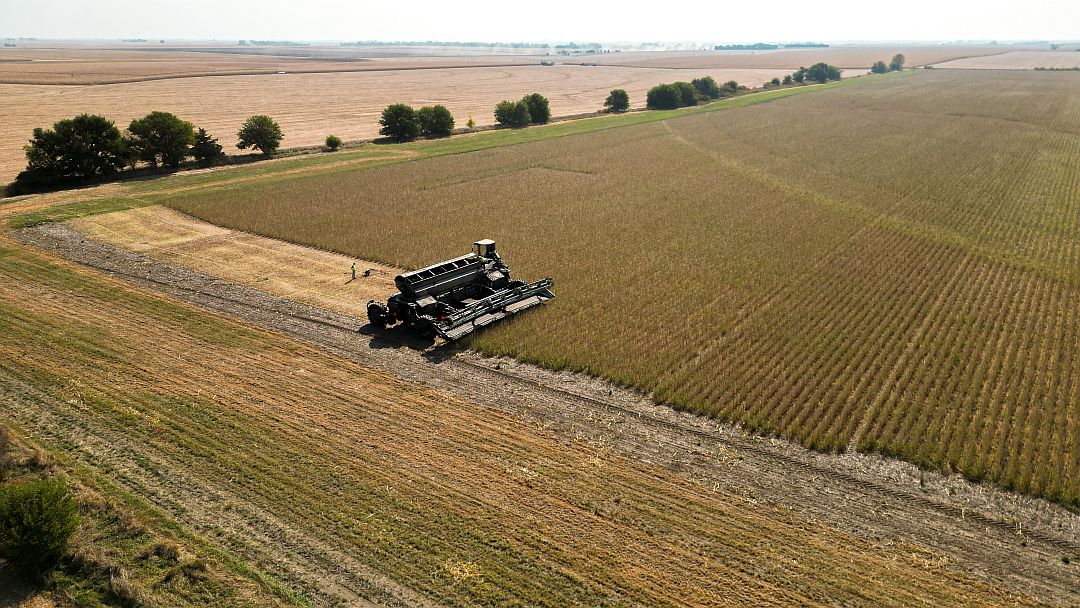[Disclosure: AgFunderNews’ parent company AgFunder is an investor in Alpine Bio.]
Alpine Bio—a molecular farming startup engineering plants to produce animal proteins in what it claims is a more sustainable and more efficient manner—has harvested its first large-scale crop of soybeans containing casein proteins in Nebraska.
“This is the culmination of seven years of R&D to get expression levels to a point where the science and the economics make sense,” says founder and CEO Magi Richani, a civil engineer who built a career at oil giant Shell in project management before setting up her own business.
“We’ve worked on the science for so long, but now we have to scale the technology in a way that makes sense for everybody across the supply chain.”
Working with strategics
Microbes can be engineered to produce casein protein via precision fermentation, she says. However, a molecular farming approach can be scaled at a fraction of the cost thanks to lower capex and operational costs and the ability to tap into existing infrastructure, claims Richani, who says most plant-based cheeses miss the mark because of how challenging it is to replicate the qualities of casein, which makes dairy cheese melt and stretch.
“A lot of these companies tried to come up with plant-based versions of cheese, spent a lot of money internally and then realized that they are never going to get where they need to be. And now they are asking, how can we get [animal-free] casein in a way that’s not cost prohibitive?”
As for the output of the Nebraska crop, she says, “We are being very focused and deliberate about sampling with key customers that can potentially bring multi-million-dollar contracts, versus, say, giving out thousands of samples [to anyone and everyone]. Our focus in the next 12 months is really on locking in key partnerships, bringing in strategics across the supply chain and working with them to accelerate scale up and minimize the amount of upfront capital we have to put in.
“And then the biggest thing is [securing] offtake agreements, because ultimately, once we have those locked in, it becomes much easier to get loans, for example, to scale up production versus relying so heavily on equity funding.”
While Alpine Bio had planned to launch its own consumer brand (Nobell Foods) to showcase its tech, she says, “We are now focusing more on a b2b model because from a capital efficiency perspective, that makes the most sense. However, we built a great brand with Nobell, so we might partner with someone to launch that brand, but we wouldn’t be the only ones investing.”
Building a closed loop system for allergen management
As for allergen management, about which the FDA recently issued a warning to molecular farming companies, she explains, “We’re growing an allergen [milk protein] in soybeans, so building a closed loop system that can scale in a safe manner has been just as important as figuring out the science, and because we are the first company to do this, we also have the responsibility to do it the right way.
“We have developed a system using industrial scale equipment for planting and harvesting that tells us exactly where our material is so that everything is tracked and traceable using GPS trackers and we have the right controls and training for everybody touching our material. We’ve worked closely with soybean industry groups and formed a closed loop system working group with other molecular farming companies to set standards for how we bring these technologies to market safely.”
She adds: “We’re also testing geofencing technology so that trucks cannot release our seeds unless they are within specified coordinates that we program into the GPS. We’re also testing visual markers that can make our seed visibly distinct from other seeds.”
Casein combinations
While Alpine Bio can produce soybeans containing all four casein proteins (in cow’s milk, they fold up into a spherical “micelle” structure in which the proteins are suspended in a solution along with calcium and other minerals) this is not strictly necessary, says Richani.
“There’s no technical limitation on making all of them at once; the question is, does that get you the best product? We have done a lot of work on isolating individual caseins, understanding their functionalities independently and in different combinations.”
In Nebraska, she says, “We have grown multiple lines with different combinations of casein proteins to test in applications as different combinations have different advantages.”

Plugging into existing processing infrastructure
From the outset, Alpine Bio developed a process that “plugs into traditional ways of purifying soy protein” with an initial step to take out the oil, a second step to separate out some of the carbohydrates from the protein and then further steps to separate the soy protein fraction and the casein protein fraction.
While it has been working with industrial scale equipment at the farm level, most soybean processing plants are built for very large scale production, notes Richani. “So we’re probably a couple of years away from being able to fit into these massive plants for smaller runs. Right now, we have partners with smaller-scale plants that tend to do more of the identity preserved crops runs, so we just have to schedule it, and do a cleaning before and after our run.”
Oil from the modified beans is highly refined, and will not have traces of dairy protein, but the soy protein stream from Alpine’s beans will have small amounts of dairy, while the casein protein stream will have small amounts of soy, says Richani.
“We could completely purify it, but it defeats our purpose; the higher the purity the higher the costs. You can still make highly functional cheeses with a combination of casein and soy protein, and you’d be surprised at how many products contain dairy and soy, so we don’t see it limiting our market,” added Richani, who is going through the GRAS (Generally Recognized as Safe) process both for the soybean and casein protein fractions.

What is molecular farming?
Companies deploying plant molecular farming typically genetically engineer plants to make them produce something they wouldn’t normally make (think vaccines made in tobacco, growth factors in barley, dairy proteins in potatoes, chymosin in safflower).
Rather than modifying the plant to confer a beneficial agronomic property such as disease resistance or improved nutrition, molecular farming companies use plants like mini-bioreactors to produce specific high-value ingredients.
Techniques vary, with some players developing transgenic crops where foreign DNA that codes for the target protein is inserted into the plant’s genome such that its ability to produce the protein is passed along to the next generation. Other players use transient (temporary) expression systems whereby the gene of interest is introduced into the plant cells such that they express the target protein, but the plant’s genetic makeup remains unchanged.
Other players to watch in the molecular farming space include:
- Dairy proteins: Mozza, Miruku (New Zealand), IngredientWerks (USA), Veloz Bio (Spain), Pigmentum and Finally Foods (Israel)
- Growth factors: Bright Biotech (UK), ORF Genetics (Iceland), BioBetter (Israel), Tiamat Sciences (USA), Core Biogenesis (France)
- Meat proteins: Moolec Science (registered in UK), IngredientWerks (USA), Kyomei (UK)
- Egg proteins: PoLoPo (Israel), Veloz Bio (Spain)
- Misc – incl sweet proteins, Mogroside V, enzymes, albumin: GreenLab (USA), Elo Life Systems (USA), Forte Protein (USA)
- Vaccines, therapeutics: Baiya Phytopharm (Thailand), Protalix Therapeutics (Israel), Bio Applications (Korea), KBio (USA), Eleva (Germany), InVitria (USA), Agrenvec (Spain) Diamante (Italy)





